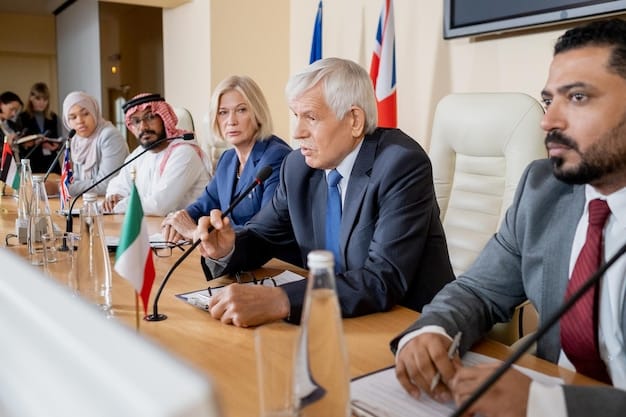US Foreign Policy Update: Implications of Recent Diplomatic Engagements

The latest developments in US foreign policy, marked by recent diplomatic engagements, underscore a strategic pivot towards re-establishing global alliances and addressing complex geopolitical challenges through dialogue and cooperation, aiming to reshape international relations and address pressing global issues effectively.
Understanding the ever-evolving landscape of global affairs requires a keen eye on the actions of major players. A comprehensive US foreign policy update: Analyzing the implications of recent diplomatic engagements reveals much about current international dynamics. How are these engagements reshaping global alliances and impacting critical issues like trade, security, and climate change?
Recent Diplomatic Shifts and Their Geopolitical Context
The intricate tapestry of global politics is constantly being rewoven, with each diplomatic thread contributing to a larger design. The United States, as a pivotal global actor, frequently recalibrates its foreign policy in response to both domestic and international pressures. Recent diplomatic engagements are not isolated events but rather strategic moves within a broader geopolitical context, reflecting a renewed emphasis on multilateralism and shared challenges.
These shifts are often driven by a multitude of factors, including evolving economic landscapes, emerging security threats, and a re-evaluation of national interests. Understanding the undercurrents guiding these diplomatic efforts is crucial to interpreting their potential implications on the global stage. From strengthening established partnerships to navigating complex rivalries, the US approach seeks to project stability and influence.
Re-engagement with Traditional Alliances
A notable aspect of current US foreign policy has been the intensified re-engagement with long-standing allies. This involves restoring trust, reinforcing security commitments, and aligning strategies on critical global issues. Such efforts aim to present a united front against shared threats and to foster collective action.
- NATO Reinforcement: Renewed commitment to the North Atlantic Treaty Organization, emphasizing collective defense and burden-sharing among member states in response to evolving security concerns.
- Indo-Pacific Partnerships: Strengthening alliances with key partners like Japan, South Korea, and Australia to counterbalance regional influences and promote stability in a strategically vital area.
- Transatlantic Dialogue: Reinvigorating diplomatic ties with European Union nations to address issues ranging from economic cooperation to climate change and digital regulation.
These re-engagements symbolize a strategic pivot away from unilateral approaches, seeking strength in numbers and shared values. The emphasis is on collaboration, joint initiatives, and a coordinated response to various global challenges, ranging from economic recovery to addressing human rights concerns.
Moreover, these diplomatic overtures extend beyond traditional security pacts to encompass economic and technological collaborations. The aim is to build resilient supply chains, foster innovation, and establish common standards in emerging technologies, thereby creating a more integrated and cooperative global economic framework. This cooperative stance is designed to ensure long-term stability and mutual prosperity among allied nations.
Within this updated foreign policy, the US is also dedicating significant resources to public diplomacy. This involves engaging directly with foreign publics through cultural exchange programs, educational initiatives, and targeted communication campaigns. The objective is to foster a deeper understanding of American values and policies, countering misinformation and building goodwill at a grassroots level. Such soft power initiatives are seen as integral to forging lasting alliances and securing strategic influence in a competitive international environment.
Addressing Contemporary Global Challenges Through Diplomacy
The current global landscape presents an array of multifaceted challenges that demand sophisticated diplomatic approaches. From climate change to cybersecurity and global health pandemics, no single nation can effectively address these issues in isolation. US foreign policy is increasingly recognizing the imperative of collaborative action to tackle these universal concerns.
Diplomatic engagements are being strategically deployed to forge consensus, mobilize resources, and coordinate international responses. This shift reflects an understanding that shared vulnerabilities require shared solutions, and that proactive diplomacy is essential to prevent these challenges from escalating into larger crises. The focus is on building resilient international frameworks.
Climate Change Diplomacy
Climate change stands as one of the most pressing global emergencies. Recent US diplomatic efforts have prioritized re-assuming a leadership role in international climate negotiations. This involves not only setting ambitious domestic goals but also encouraging other major emitters to follow suit, offering technological assistance where possible.
- Rejoining the Paris Agreement: A significant symbolic and practical step signaling renewed commitment to international climate action and multilateral cooperation on environmental issues.
- International Climate Summits: Active participation and leadership in global forums aimed at accelerating emissions reductions and fostering adaptation strategies worldwide.
- Green Technology Collaboration: Promoting partnerships for the development and deployment of sustainable technologies, including renewable energy and carbon capture solutions.
These diplomatic initiatives are designed to accelerate the global transition to a sustainable future, recognizing that economic development and environmental protection are not mutually exclusive but rather interdependent. The strategy involves both direct governmental engagement and partnerships with private sector entities and civil society organizations to amplify impact.
Furthermore, climate diplomacy extends to financial mechanisms, with the US advocating for international funding to support developing nations in their climate adaptation and mitigation efforts. This includes channeling investments into climate-resilient infrastructure and sustainable agriculture, ensuring that the global climate response is equitable and inclusive.
The updated foreign policy also emphasizes the importance of science-based policymaking in addressing climate change. Diplomatic efforts frequently involve sharing scientific data, best practices, and innovative solutions, fostering a collaborative approach to research and development across national borders. This interdisciplinary approach is vital for developing effective and sustainable responses to the complexities of climate change, ensuring that policy is informed by the latest scientific understanding.

Global Health Security
The COVID-19 pandemic underscored the critical importance of robust global health security frameworks. US foreign policy has subsequently intensified efforts to strengthen international cooperation on pandemic preparedness, response, and vaccine equity.
This includes advocating for reforms within international health organizations, supporting vaccine manufacturing and distribution in developing countries, and enhancing disease surveillance capabilities worldwide. The aim is to build a more resilient global health architecture capable of preventing and mitigating future health crises.
Moreover, diplomatic tools are being used to address food security and humanitarian crises, often exacerbated by climate change and conflict. The US is engaging with international organizations and partner countries to provide aid, support refugees, and promote long-term stability in vulnerable regions. This humanitarian dimension is a core component of its foreign policy, reflecting a commitment to global welfare.
The emphasis on global health security is multifaceted, incorporating financial commitments, knowledge sharing, and logistical support. The US is active in initiatives that promote equitable access to medical resources, including diagnostic tools and therapeutic treatments, aiming to minimize disparities in global health outcomes. This comprehensive approach reflects a recognition of health as a fundamental human right and a critical component of international stability.
Additionally, US foreign policy highlights the importance of public-private partnerships in advancing global health. Diplomatic efforts support collaborations between governments, pharmaceutical companies, research institutions, and NGOs to accelerate vaccine development, enhance healthcare infrastructure, and deliver essential medical services to underserved populations worldwide. This synergistic approach leverages diverse expertise and resources to address complex health challenges effectively.
Economic Diplomacy and Trade Relations
Economic considerations remain a cornerstone of US foreign policy. Recent diplomatic engagements have placed a significant emphasis on revitalizing trade relations, promoting fair economic practices, and fostering global economic stability. The approach seeks to balance national economic interests with a commitment to a rules-based international trading system.
This involves nuanced negotiations that aim to address trade imbalances, tackle intellectual property theft, and promote sustainable economic growth. Diplomatic efforts also focus on ensuring resilient supply chains and fostering innovation in critical sectors, thereby bolstering national and global economic security.
Rebuilding Trade Partnerships
Following periods of protectionist tendencies, recent US foreign policy has pivoted towards rebuilding and strengthening trade partnerships. This involves negotiating new agreements, resolving disputes, and enhancing economic cooperation with key global markets.
- Tariff Re-evaluations: Reviewing and adjusting tariffs to facilitate smoother trade flows and reduce economic friction with allies and major trading partners.
- Digital Trade Standards: Promoting global frameworks for digital trade that ensure open data flows, consumer protection, and fair competition in the burgeoning digital economy.
- Investment Promotion: Encouraging US investment abroad and attracting foreign investment to the United States, fostering job creation and economic growth on both sides.
These initiatives are designed to create a more predictable and equitable global trading environment, benefiting businesses and consumers alike. The focus is on fostering economic interdependence that promotes shared prosperity and minimizes the potential for trade-related conflicts.
The current administration is also actively engaging in dialogues to address the economic challenges posed by state-sponsored industrial policies and unfair trade practices. Diplomacy is being leveraged to advocate for a level playing field, ensuring that all nations adhere to international trade rules and norms, thereby promoting a more transparent and competitive global market. This push for fairness is central to long-term economic stability.
Furthermore, US economic diplomacy is increasingly intertwined with its national security objectives. Efforts are underway to reduce dependence on critical raw materials and technologies from geopolitical rivals, encouraging diversification of supply chains through partnerships with allied nations. This strategic economic alignment aims to bolster resilience against potential disruptions and ensure national security in a complex global economy.
Security Dimensions and Regional Stability
Maintaining regional and global stability is a perpetual objective of US foreign policy. Recent diplomatic engagements reflect a proactive approach to de-escalating tensions, preventing conflicts, and addressing emerging security threats. This involves a combination of military deterrence, diplomatic negotiations, and targeted sanctions.
The strategy emphasizes strengthening international cooperation on counter-terrorism, non-proliferation, and maritime security. It also involves supporting democratic transitions and human rights, recognizing that instability in one region can have far-reaching global implications. The overarching goal is to foster a more secure and predictable international environment.
Non-Proliferation Efforts
Nuclear proliferation remains a critical global concern. US foreign policy continues to prioritize non-proliferation efforts through diplomatic channels, aiming to prevent the spread of weapons of mass destruction and to manage existing nuclear arsenals responsibly.
This includes engaging with international bodies like the International Atomic Energy Agency (IAEA), negotiating arms control treaties, and implementing sanctions against states that violate non-proliferation norms. The diplomatic approach seeks to foster trust and verification mechanisms to ensure global security.
The US is also actively engaging in cybersecurity diplomacy, recognizing the threat posed by state-sponsored cyberattacks, ransomware, and digital espionage. Efforts are underway to establish international norms of responsible state behavior in cyberspace, promote information sharing, and build collective defenses against malicious cyber activities. This emerging area of diplomacy is crucial for protecting critical infrastructure and national security.
Moreover, security diplomacy involves addressing protracted conflicts and humanitarian crises, often through multilateral initiatives. The US participates in peacekeeping operations, provides security assistance to allies, and engages in mediation efforts to de-escalate tensions in conflict-affected regions. These comprehensive security efforts reflect a commitment to international peace and stability.
In addition, US foreign policy is actively involved in strengthening regional security dialogues and frameworks, particularly in volatile areas. This includes supporting initiatives that promote confidence-building measures, conflict resolution mechanisms, and joint military exercises with partners. The goal is to build a network of security cooperation that reduces the risk of conflict and enhances collective responses to shared threats, fostering a more stable global environment.

Human Rights and Democratic Promotion
A core tenet of US foreign policy traditionally involves promoting human rights and democratic values abroad. Recent diplomatic engagements have reaffirmed this commitment, often integrating human rights considerations into bilateral and multilateral discussions. While balancing pragmatic interests, the US seeks to encourage governance that respects individual liberties.
This includes advocating for political freedoms, supporting civil society organizations, and condemning human rights abuses where they occur. The approach leverages various diplomatic tools, from public statements and sanctions to behind-the-scenes negotiations, to advance the cause of freedom and justice globally.
Supporting Democratic Transitions
In regions undergoing political transitions, US foreign policy often seeks to support movements towards greater democracy and accountability. This involves providing assistance for electoral processes, strengthening democratic institutions, and promoting inclusive governance.
- Electoral Support: Offering technical assistance and observation missions to ensure free and fair elections in emerging democracies, bolstering transparency and legitimacy.
- Civil Society Engagement: Partnering with non-governmental organizations and human rights defenders to empower local voices and strengthen democratic foundations.
- Anti-Corruption Initiatives: Supporting international efforts to combat corruption, which undermines democratic governance and economic development, promoting transparency and rule of law.
These efforts are rooted in the belief that stable, democratic nations are more likely to be reliable partners and contribute positively to global peace and prosperity. The initiatives aim to strengthen a rules-based international order where human dignity is universally respected.
Furthermore, human rights diplomacy involves engaging with international bodies such as the UN Human Rights Council and utilizing various multilateral platforms to address systemic human rights violations. The US consistently advocates for accountability and justice, working with allies to exert collective pressure on nations that fail to uphold their human rights obligations. This multifaceted approach underscores a steadfast commitment to universal human dignity.
The updated foreign policy also emphasizes the importance of digital rights and freedom of expression in the online sphere. Diplomacy aims to counter authoritarian efforts to restrict internet access and control information, promoting an open, secure, and reliable internet for all. This includes advocating for policies that protect privacy, combat censorship, and ensure the free flow of information, recognizing the internet’s role in empowering citizens and fostering democratic discourse globally.
Future Trajectories and Adaptability of US Foreign Policy
Forecasting the future of US foreign policy involves acknowledging its inherent dynamism and adaptability. The implications of recent diplomatic engagements will continue to unfold, shaping international relations in profound ways. The ability of the US to respond effectively to unforeseen challenges and opportunities will hinge on its capacity for strategic flexibility and sustained diplomatic efforts.
Future trajectories are likely to emphasize a blend of traditional power projection and modern soft power, with an increasing reliance on multilateral institutions and collaborative frameworks. The global landscape is too interconnected for any single nation to operate in isolation, necessitating continued engagement and partnership.
Navigating Emerging Global Powers
The rise of new global powers presents both challenges and opportunities for US foreign policy. Diplomacy will be critical in managing complex relationships, fostering constructive competition, and mitigating potential conflicts.
This involves a delicate balance of cooperation on shared interests, such as climate change and global health, while robustly addressing areas of disagreement, including human rights and territorial disputes. The goal is to ensure a stable and rules-based international order that accommodates multiple centers of influence.
Moreover, the emphasis on technological diplomacy will likely intensify. This includes collaborating on research and development, establishing common ethical guidelines for AI and other emerging technologies, and securing critical technological supply chains. The intersection of technology and foreign policy will be a defining feature of future international relations.
The future of US foreign policy also depends on its domestic resilience and political consensus. A strong and unified domestic front enables more effective and consistent engagement on the world stage, lending credibility and strength to diplomatic initiatives. Internal cohesion is increasingly recognized as a vital component of external influence.
Additionally, adaptive measures within foreign policy will focus on enhancing humanitarian responses to global crises, including natural disasters and conflict-induced displacements. The US will likely continue to lead efforts in providing aid, coordinating international relief, and addressing the root causes of vulnerability, demonstrating its commitment to global humanitarian principles. This proactive and compassionate approach reaffirms its role as a global leader in times of crisis.
| Key Area | Brief Description |
|---|---|
| 🤝 Alliance Re-engagement | Strengthening ties with traditional partners like NATO and Indo-Pacific allies to enhance collective security and cooperation. |
| 🌍 Global Challenges | Prioritizing climate change diplomacy and global health security through multilateral initiatives and resource mobilization. |
| 📈 Economic & Trade | Rebuilding trade partnerships, promoting fair practices, and fostering secure supply chains for global economic stability. |
| 🕊️ Security & Human Rights | Focus on non-proliferation, regional stability, democratic promotion, and advocating for universal human rights. |
Frequently Asked Questions About US Foreign Policy
▼
A primary focus of current US foreign policy revolves around re-establishing and strengthening alliances, particularly with traditional partners in Europe and the Indo-Pacific. This aims to bolster collective security, promote shared values, and address common global challenges more effectively through multilateral cooperation rather than unilateral action, ensuring a united front on critical issues and fostering stability.
▼
US foreign policy is addressing climate change by rejoining the Paris Agreement and actively engaging in international climate summits. It pushes for ambitious emissions reductions, promotes green technology collaboration, and advocates for financial support to developing nations for adaptation and mitigation efforts. This approach aims to secure a lead role in global environmental efforts, driving collective climate action.
▼
Economic diplomacy within US foreign policy focuses on revitalizing trade relations, promoting fair economic practices, and ensuring global economic stability. This includes negotiating new trade agreements, resolving disputes, and fostering resilient supply chains. The goal is to create an equitable trading environment that benefits all nations and supports sustained economic growth worldwide, balancing national and global interests.
▼
The US integrates human rights and democratic promotion into its foreign policy by supporting civil society organizations, advocating for political freedoms, and condemning abuses. It provides assistance for electoral processes in emerging democracies and engages with international bodies like the UN Human Rights Council, aiming to encourage governance that respects individual liberties and accountability across the globe.
▼
The long-term implications of recent diplomatic engagements point towards a more multilateral and collaborative approach to global challenges. They aim to foster a stable, rules-based international order that can address complex issues like climate change, global health, and economic disparities. This strategy intends to enhance US influence through cooperation while adapting to the rise of new global powers and unforeseen events.
Conclusion
The recent diplomatic engagements of the United States represent a significant recalibration of its foreign policy, emphasizing collaboration, re-engagement with allies, and a proactive stance on global challenges. These shifts underscore a recognition that the interconnected nature of the modern world necessitates shared solutions and multilateral cooperation. From climate change and global health to economic stability and human rights, the US is navigating a complex international landscape with renewed determination to shape a more secure, prosperous, and equitable future for all. The ongoing updates to US foreign policy reflect a commitment to adaptability and strategic engagement, crucial elements for sustained global leadership.





